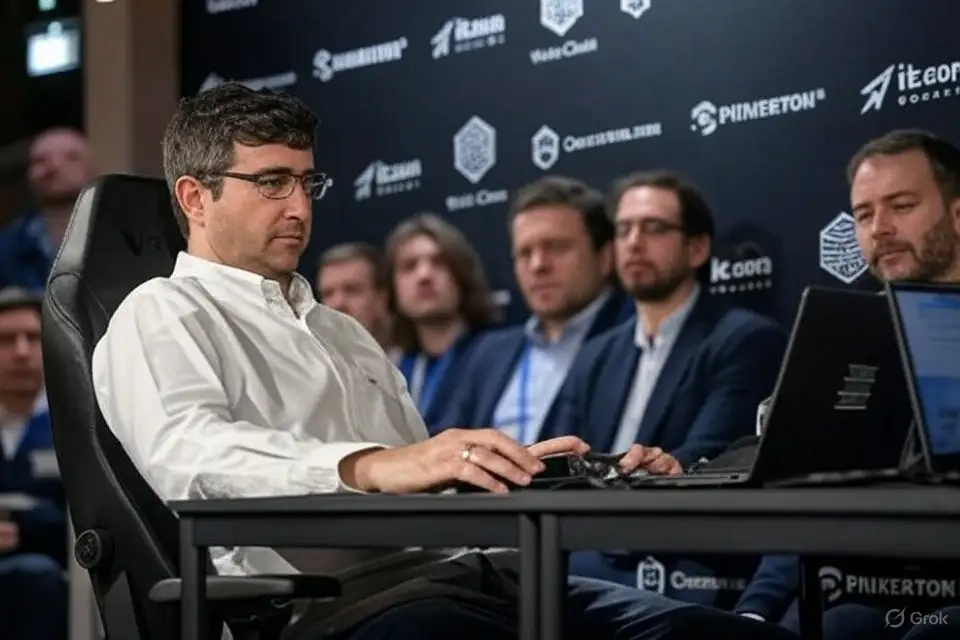The International Chess Federation (FIDE) has formally filed a complaint with its Ethics and Disciplinary Commission (EDC), naming former world champion Vladimir Kramnik as the respondent. The move marks the most serious institutional response yet to Kramnik’s prolonged campaign of public cheating accusations against fellow grandmasters — most notably Daniel Naroditsky and David Navara.
A Formal Step After Months of Controversy
FIDE’s complaint cites a “pattern of conduct over roughly two years,” referring to repeated statements and materials Kramnik posted online that allegedly violated ethical rules related to harassment and insulting an individual’s dignity. The case includes information provided by Navara and by individuals close to Naroditsky, who died last month at age 29.
According to the federation’s announcement, the complaint will now be reviewed under the EDC’s established procedures. If accepted, the case proceeds to a First Instance Chamber, which will notify both parties. Kramnik will then have three weeks to respond, with possible extensions for additional evidence exchanges before a decision is issued.
The complaint represents a rare disciplinary move against a world champion — one of only 17 in history — underscoring the seriousness with which FIDE now treats public accusations of cheating without evidence.
The Long Road to the Ethics Case
The dispute traces back to late 2023, when Kramnik posted a statement on Chess.com implying that an unnamed elite player was cheating. Many believed he was referring to Hikaru Nakamura, who publicly demanded clarification. Chess.com later muted and suspended Kramnik’s account for violating its terms of service, citing repeated, unsubstantiated accusations.
Over the following year, Kramnik expanded his campaign. He published statistical analyses, accused several players — including minors — of cheating, and in May 2024 released a list titled “Cheating Tuesdays,” which included Czech grandmaster David Navara. Navara filed a formal complaint with FIDE, arguing that Kramnik’s actions were unethical, unscientific, and personally harmful.
In a 2025 blog post, Navara described how the ordeal affected his mental health, writing that it had “induced suicidal thoughts and caused [him] a lot of pain.” Kramnik responded by threatening lawsuits against Navara, Chess.com, and Chessdom.com for defamation.
The Naroditsky Fallout
The controversy reignited in October 2025, when American grandmaster and streamer Daniel Naroditsky died unexpectedly. Kramnik had accused him for months of online cheating, again without concrete proof. Following Naroditsky’s death, several top players, including Magnus Carlsen, Hikaru Nakamura, and Nihal Sarin, condemned Kramnik’s behavior as irresponsible and damaging.
Sarin told The Indian Express that Kramnik “has kind of literally taken a life,” a sentiment echoed widely in the chess community. British international master Jovanka Houska supported FIDE’s investigation, saying that players “should not be allowed to accuse others of cheating without consequences.”
The backlash led FIDE to initiate an internal review on October 22, just two days after Naroditsky’s passing. Today’s complaint is the outcome of that review.
What Happens Next
According to EDC Chairwoman Yolander Persaud, once the complaint is deemed admissible, the respondent — in this case, Kramnik — will be notified of the proceedings and invited to submit a written defense. The process can take several months, and potential sanctions range from a formal warning to suspension or expulsion from FIDE events.
The case is expected to test how far FIDE can or should go in regulating speech outside formal competition — a growing issue in the age of social media, where elite players wield large online audiences.
A Turning Point for Chess Governance
The Kramnik case could become a precedent for how chess authorities handle ethical boundaries in public discourse. For years, accusations of online cheating have circulated freely on social media, often without consequences. By referring Kramnik to its Ethics and Disciplinary Commission, FIDE appears to be signaling a new line: that even legends of the game are accountable under its code of conduct.
If found guilty, Kramnik could face sanctions affecting his participation in FIDE events or roles in official capacities. But even before a verdict, the case itself sends a message — that the era of unmoderated public witch-hunts in chess may be coming to an end.
I’m the senior editor of Attacking Chess, a keen chess player, rated above 2300 in chess.com. You can challenge me or asking questions at Chess.com.

